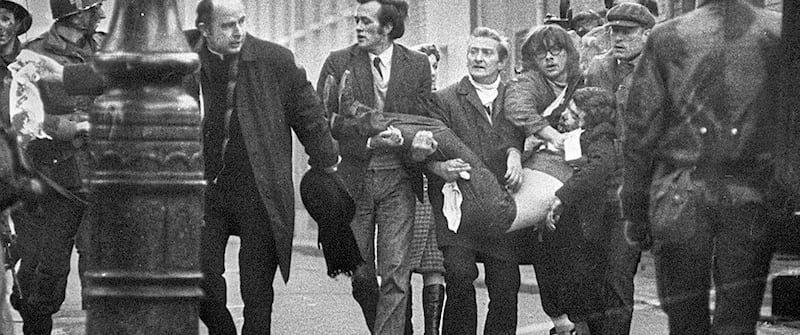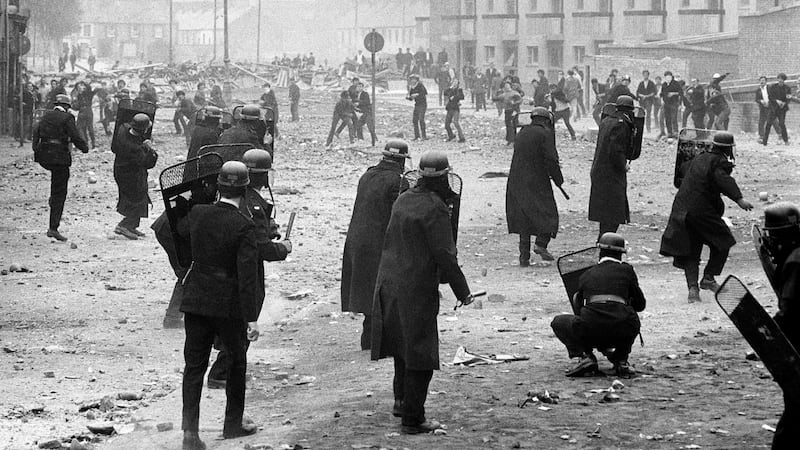I have a friend in Australia. He left Derry on a bitterly cold day in January 1974, to arrive about 36 hours later in the blistering heat of summer in South Australia.
What I find fascinating about him is that he’s never been back. And I have this idea in the back of my head that it would make a great television programme if he could be persuaded to make a return home.
Imagine this, a young fella of 14 leaving with his mother and brothers. His father has been killed in a road accident, and in the wake of Bloody Sunday the mother feels that there is no future for her boys here.
It is a massive, life-changing decision but she is a strong woman.
By all accounts my mucker didn’t want to go. He had lots of friends, he went fishing on the Faughan almost every day, and he had found his first love. He’s never forgotten her.
I met him in Adelaide about 30 years ago and we got talking. He remembered a Derry that was in turmoil. There were daily riots. You had to be careful where you walked with a school uniform, as the area where they lived was mixed and being in the wrong place at the wrong time could be problematic.
Members of the B-Specials lived in their estate and the RUC regularly stopped and generally harassed young Catholic boys.
It hardly needs saying if he came back today, it would be a very different Derry he would be returning to. The camera could catch the wonder as he sees his old city for the first time in half a century.
The riots, the RUC, the B-Specials, the British Army have all gone. And the city itself is changed physically beyond measure.

I should point out that if the IRA’s bombing campaign had any upside at all, it was that it got rid of a lot of ugly old buildings.
Where I am going with all this is that some weeks back I was out for a pint with a family member and we got into a discussion, as usual, about politics.
My buddy had the temerity to suggest that back in the day nationalists in the north were actually better off than we were in the Republic.
He pointed to relatives living in the Strabane area who had jobs in a factory there, lived in a nice house and had a car. The lady of the house could even afford to get her hair done once a week.
By way of contrast, he pointed to our circumstances at the time. Like thousands of others, we lived in a council house, money was scare, we had no car and my mother would get her hair done about every six months.
What was all the unrest and violence about? What had the nationalist community to complain about? Sure we in the south didn’t take to the streets to bomb, shoot and cause mayhem.
My inner Gerry Adams emerged in my outrage at such a simplistic analysis. Out it poured like lava from a volcano…

What about 50 years of unionist rule at Stormont? What about a police force that was 93 per cent Protestant and unionist? What about the bigotry of the B-Specials, which was 100 per cent Protestant and unionist?
What about the sectarianism and discrimination where the Catholic areas of Derry, Strabane and west Belfast were the poorest regions by far in the so-called United Kingdom?
You get the picture.
Anyway, on mature reflection the thought occurred that the mother of my friend in Australia must have taken the kind of stuff I was spewing out into account when making her decision to uproot her family and take them to the other side of the world.
In Derry at that time, the ‘faceless men’ had ensured no investment came west of the Bann. Unemployment was endemic and emigration was the only real option. So, if they wanted a better life, it was Australia for my mucker.
And like a lot of Irish emigrants, he has done well. But he has paid a heavy price too. Family and friends have been lost as the years take their toll. And he can get very emotional when talking about friends and family and about a life left behind.
Had things been different they would have preferred to stay. Of that there is no doubt.
One final thing, some years ago I was invited to a party in the Claudy area. During the course of the evening I got talking to this woman as we queued for the tea and sandwiches. I thought nothing of it, but a few minutes later a man approached me and asked did I know the woman I had been talking to.
Obviously I didn’t. It turned out that she was the girlfriend, the first love of my mucker in Australia, the girl he talked so fondly of that night in Adelaide. She’s a granny now.
I often wonder should I tell him I have met her…




